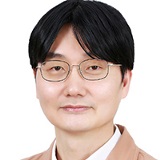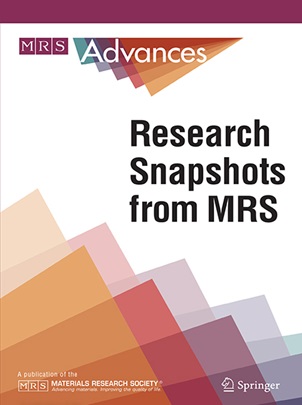
2023 MRS Spring Meeting
Our 2023 MRS Spring Meeting & Exhibit took place April 10-14 in San Francisco, California at the Moscone Center West and nearby Marriott Marquis and InterContinental San Francisco. The in-person meeting was followed by three days of exclusive virtual content April 25-27.
Our spring meetings are the key forum to present research to an interdisciplinary and international audience. Attendees this spring received a glimpse into the future of materials science, networked with colleagues, made new connections, and celebrated MRS' 50th Anniversary.
Celebrating a Legacy of Innovation
We started our year-long celebration of 50 years of service to the materials research community at the 2023 MRS Spring Meeting & Exhibit in April. For half a century, MRS has proudly represented the interests of thousands of materials researchers across disciplines, generations and continents. In collaboration with our global Membership, we have forged an unparalleled legacy of innovation at the leading edge of materials research and look forward to building on our momentum as we continue to invest in our field for years to come.
2023 Spring Meeting Highlights
MRS TV is back to celebrate the 50th anniversary of the Materials Research Society! We're taking a look back at how far MRS has come in the last 5 decades, through all of the research it's motivated, and all the relationships it's fostered.
In this episode:
- 50th Anniversary Meeting Highlights | MRS Spring Meeting Chairs
- 50 Years of the Materials Research Society | Vice President Takao Someya
- Anne Lynn Gillian-Daniel | MRS Award Spotlight
Plus, features from top research institutions around the world: Max Planck Institute for Microstructure Physics Center for Research Excellence on Dynamically Deformed Solids at Texas A&M University Lake Shore Cryotronics
Symposium Topics
EL02—Material Innovation Toward Stable Halide Perovskite Electronics
EL03—Frontiers in Electrochromic Materials and Devices
EL04—Metal Halide Perovskites for Applications Beyond Optoelectronics
EL05—Molecular and Colloidal Plasmonics—From Synthesis to Application
EL06—Adaptive Nanophotonics—Tunable, Reprogrammable and Integrated Nanophotonics
EL07—Group IV Nanostructures for Emerging Optoelectronic Applications
EL08—Nanogenerators and Piezotronics
EL09—Layered (2D) Optoelectronic Materials and Devices
EL10—Dynamical Molecular-Scale Opto-Electronic Devices
EL12—From Molecules to Emerging Molecular Devices—Beyond Electronic Transport
EL14—High Throughput Discovery of the Next-Generation Semiconductors for Opto-Electronics
EL15—Radiation—Hard and Lightweight Next-Generation Semiconductor Electronics
EL16—Plasmonics, Metasurfaces and Metamaterials—Design, Materials and Applications
EL19—Advanced Materials in Scalable Miniaturized Technologies for Future Electronics
EL20—Photo and Radiation Detection with Organic, Perovskite and Nano-crystalline Semiconductors
EL21—Materials Research Opportunities for Energy Efficient Computing
EN01—Electrochemical Capacitors and Related Devices—Fundamentals, Materials and Cell Design
EN02—Thin-Film Compound Semiconductor Photovoltaics
EN03—Caloric Materials for Heating and Cooling
EN04—Two-Dimensional Materials for Energy Conversion
EN05—Advances in Materials for Concentrating Solar Thermal Technologies
EN06—Advances in Solid-State Electrolyte Development
EN07—Critical Materials for Energy—Enhanced Functionality, Sustainable Supply and Replacement
EN08—Solid-State Batteries—Devices, Interfaces and Characterization
EN09—Polymeric and Organic Materials for Electrochemical Energy Storage
EN10—Decomposing Materials Wastes—Physical, Chemical and Biological Approaches
EN11—Advanced Materials for Thermal Management of Human-Building-Energy Nexus
SB01—Fundamentals and Applications of Engineered Living Materials
SB02—Emerging Nanotechnologies for Cellular Interrogation and Manipulation
SB03—Thin-Film Devices, Barriers and Their Reliability
SB04—Flexible Bioelectronics for In Situ Analysis
SB05—Nano-Bio Interactions—From Design to Biological Response
SB06—Peptide and Protein-Based Materials
SB07—Frontiers of Unconventional Polymer Networks
SB08—Soft Matter Materials and Mechanics for Haptic Interfaces
SB09—Polymeric Electronic Materials and Devices for Biological Interfaces
SF01—High Entropy Materials—From Fundamentals to Potential Applications
SF02—Materials in Space—Design and Testing
SF03—Emerging Thermal Materials—From Nanoscale Heat Transport, Devices and Applications, to Theories
SF04—Development and Design of Responsive Architected Materials
SF05—Building Advanced Materials via Aggregation and Self-assembly
Meeting Chairs
-

Intel Corporation
-

Seoul National University
-

Nanyang Technological University
-

The University of Tennessee, Knoxville
-

Call for Papers
Scientific Basis for Nuclear Waste Management XLVIII: Towards Effective Nuclear Waste Management - Progress and Challenges
This special issue focuses on the science and technology of nuclear waste management, emphasizing performance and key challenges. It assesses nuclear waste forms and their compatibility with geological disposal, explores waste processing technologies, and discusses state-of-the-art development of sorbent materials for radionuclide capture.


